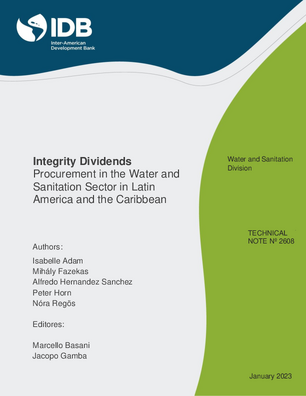Integrity Dividends: Procurement in the Water and Sanitation Sector in Latin America and the Caribbean
Date
Dec 2022
EDITOR
Marcello Basani, Jacopo Gamba
Public procurement represents a large portion of government expenditure, more so in developing economies. Inefficiencies in public expenditures thus place a heavy burden on society. The Water and Sanitation (W&S) sector is especially vulnerable to public procurement inefficiencies due to the capital-intensive and complex nature of large-scale projects such as sewage, pipelines, and general maintenance. Recent studies have found that quality of corporate governance and transparency of water utilities as well as regulatory and supervisory agencies are key drivers of the sectors performance.
To support better policies in the W&S sector, this report conducts a sectoral measurement of public procurement integrity using government administrative data and identifies effective interventions for improving the performance of utilities.
The following questions are explored: Which types of integrity risk carry the highest economic costs? What are effective policy solutions? Which address the most impactful risks effectively? What are the price savings and project-delay-reducing impacts of such solutions?
To this effect, the study analyzes data for six countries in the Latin American & Caribbean region. Several regression models were run to assess which indicators of integrity are good predictors of improved outcomes in terms of price (unit or relative) and quality (delays) of public purchases in the sector.
To support better policies in the W&S sector, this report conducts a sectoral measurement of public procurement integrity using government administrative data and identifies effective interventions for improving the performance of utilities.
The following questions are explored: Which types of integrity risk carry the highest economic costs? What are effective policy solutions? Which address the most impactful risks effectively? What are the price savings and project-delay-reducing impacts of such solutions?
To this effect, the study analyzes data for six countries in the Latin American & Caribbean region. Several regression models were run to assess which indicators of integrity are good predictors of improved outcomes in terms of price (unit or relative) and quality (delays) of public purchases in the sector.




